Memoirs & Diaries - A July Day at St Julien
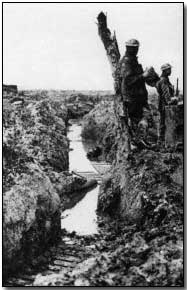 We had waited a long time
for nine o'clock on that July night of 1917, and now that we were nearing
the hour to be off we wanted sleep.
We had waited a long time
for nine o'clock on that July night of 1917, and now that we were nearing
the hour to be off we wanted sleep.
Yet, through the nervous excitement which weeks of preparation had engendered we could doze but fitfully.
On the rat-eaten boards of a dug-out on the canal bank we sprawled, pinned down by our battle clobber. A curtain hung at the door to keep out gas. It also kept out the twilight.
"Can't someone get a blasted light?" Private Smith suddenly exclaimed, and as an answer a match was struck, applied to a piece of four-by-two, which in turn was stuck in the middle of a tin of dubbin. This acted as a candle, and threw a strange eerie light that turned the faces of the twenty of us who were huddled there a pale green, with dark shadows that made holes for eyes.
Smith, who stared vacantly across to my side, broke the silence again.
"God, this makes you think," he said, in a voice which wasn't quite like his own.
"Put a sock in it, Smith," was the solitary answer he received to his philosophy, and once more silence descended upon the dug-out, and shadows jumped over the domed roof as the green light bobbed up and down.
I reflected idly on the happenings of the past month. Right back, where we could sleep in tolerably clean straw and pinch the eggs and cherries of an old French farmer, we had also crushed down his growing wheat and had cut trenches across his fields.
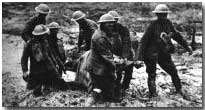 We
were told that these trenches followed the line of those we were to attack
later, and, having cut them out, we rushed over them every day for a
fortnight, always, at the end, capturing the little village of St. Julien at
the bayonet.
We
were told that these trenches followed the line of those we were to attack
later, and, having cut them out, we rushed over them every day for a
fortnight, always, at the end, capturing the little village of St. Julien at
the bayonet.
Only it was rather different there. You see we had a breathing space half-way across the fields, and from nowhere French girls came with baskets of oranges and chocolates for heroes - only the heroes had to pay through the nose for the dry or gritty delicacies.
It was a great holiday, that - when we put one foot in paradise, experienced the unregretted loss of lousy shirts, stole eggs for breakfast, got fruit for tea and generally were fattened up. For what end?
Then we marched back again. But we were still fairly well behind the line. There the sergeant, whom we hated because he snarled every time he spoke, was unlucky, for a flying piece of Iron caught him in the liver. Somehow we found we were sorry when he died because when he had gone we discovered there were a lot of things he had done for his platoon that weren't done for anyone else.
Then there was the working party that went out to carry "footballs" up to the front line and, cutting across the field between the two lines of trenches by way of the light railway, was suddenly swept by German guns, and turned back, with gas-masks fixed, into a dug-out to lay panting.
But eleven of the twenty-four were left huddled up by the railway line. And the colonel had told Brigade Headquarters, so the rumour ran, that he wasn't going to have his bloody battalion cut up before they began. (At any rate, there were no more working parties.)
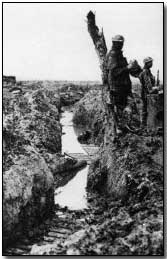 And as the movements in the
back area increased, the padre rigged up a cross on a sugar box one morning,
and we had communion, though the beer parade collided with this. What
memories! It seemed so long ago: we were much nearer to death now...
And as the movements in the
back area increased, the padre rigged up a cross on a sugar box one morning,
and we had communion, though the beer parade collided with this. What
memories! It seemed so long ago: we were much nearer to death now...
There was a tap on the curtain which was lifted as the colonel came in. I don't know where we had picked up the old man, but he was a decent old buck.
"Now, my boys," - something like that he began - "you've been practising and waiting for this moment for a long time. Try to remember what you have learnt, and keep up the name of the regiment. I've just come to wish you all the best of luck. There'll be some porridge up soon. Fill your bellies. And God bless you."
I hadn't the heart to eat much of the porridge. I stuffed down two or three spoonfuls and dozed off again...
I awoke with a start. The light had burnt out. My mate, George, gave me a kick because I wasn't moving.
"Come on," he said; "they're falling in."
"Here, give me a hand. This blasted clobber's weighing me down."
He pulled me up, and with a good deal of clatter we struggled through the little door. There was still a bit of light in the sky, which was reflected in the muddy water of the canal. There was also a suggestion of rain in the wind.
We fell in. The roll was called: we were all there. Then, in single file, we turned left to the communication trench and the enemy's lines.
We reached our positions and waited, sprawling in the Flanders mud on a summer's night. George and I sprawled together to keep warm; for even a summer's night, with the rain in the wind which comes across the plain, Flanders can be chilly.
George, always a voluble member of the platoon, had still a little to say, though now in whispers. He could see no outcome of the War in its present form. In the evening platoon discussions he had been in favour of a general armistice. But he pronounced it "ar-mis-tik," with the accent on the second syllable.
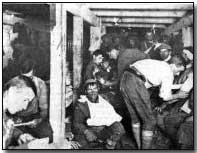 "If only we could have an
armistik," he began, as Fritz started a devil's tattoo on his machine guns.
Ta-t-t t-ta! How well he played it.. Then from our own lines
came the finishing notes, Ta-ta. We laughed at this exchange of
courtesies, in spite of our discomfort.
"If only we could have an
armistik," he began, as Fritz started a devil's tattoo on his machine guns.
Ta-t-t t-ta! How well he played it.. Then from our own lines
came the finishing notes, Ta-ta. We laughed at this exchange of
courtesies, in spite of our discomfort.
They kept it up till the thing got on my nerves. Then the guns which had been growling in the background suddenly burst out in a screaming tornado of lead, and heavy stuff dropped just behind us. There was some suppressed commotion.
"Stretcher bearers," came a voice.
"Coming up," was the reply.
"Someone hit," muttered George.
"Ay."
"Lucky sod. He's saved a lot of trouble."
I never knew who it was. The poor devil called out for his mother.
"Oh, put a sock in his blasted mouth," came another nerve-racked voice.
The stretcher bearers got the chap away and there was quiet again. Every few minutes the officers came round to see if we were all right. I was more thankful to see the cooks. They had struggled up with hot tea, strengthened with rum.
It was the most liberal treatment we had had during the War. By the way the liquor burned, I should say it was fifty-fifty. The youngest lad in the platoon - he must have lied to get into the Army, poor fool - crawled on his belly and would insist on shaking hands with every one of us. He was thoroughly drunk.
It was still dark, and my illuminated watch said 3.30. That meant half an hour more. Then we became very silent, and even the guns seemed to be still. It seemed like the calm that comes before the thunderstorm...
An officer came round once more.
"Five minutes more, boys," he said; "get ready."
We fixed our bayonets. We gripped each other's hands. And waited. My heart seemed to take up that devil's tattoo and thumped against my ribs...
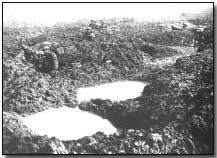 Suddenly
it came.
Suddenly
it came.
I can still hear those three sharp staccato cannon shots which seemed to split the darkness, for there followed a tremendous roar and crash which sent the first light of dawn trembling along the distant horizon above the mist, suddenly to burst into miles of flames.
And from No Man's Land shot up a myriad of distress lights, trembling. And "express trains" roared overhead. It was a wonderful moment. Some magic force drew us up from our crouching positions, and in the blue mist which still clung to the hollows in the battlefield we looked like ghosts wreathed by smoke. Eighty thousand of us.
Then we swept forward as if caught by the wind. The spreading light of dawn caught the glint of bayonets as they moved on and on...
I met Ira by the side of a shell hole. He had pulled out his leg from the squelchy mud which had dragged him down to the knee. Months we had campaigned together. The happiness which we had managed to squeeze out of those dreary months we shared; the sorrows we shared; the parcels from home we shared.
On those blessed days of rest we had flung bits of poetry to each other and had teased to say what we had quoted. We thought that after the War we would quit the monotonous life at home and would go adventuring. We had mapped out what we would do, where we would go - this country and that.
They knew us as the twins. Before we went over we had been told to press on: if a man dropped down he must be left - others would follow to patch him up.
"If you fall I shall stop," said Ira to me a day before. "Hell to them all! I shall stop." But we were separated before we began. He was attached to another platoon.
I saw him as I went over. He was well.
He laughed as he swore, "What a bloody mess!" We said good-bye - "God be with you."
I never saw him again.
Later I wrote to him. The letter was returned - undelivered. The mark of a rubber stamp was on the envelope, "Killed in action." Just that. A country's regrets to me that my friend was dead...
Most of the firing had been on our side. We did not know it at the time. There was such a screaming in the air that lead seemed to be flying everywhere. Something whipped by and one swore that his ear had been missed by a hair's breadth.
In front our barrage fell like a curtain and the earth vomited up mud and dirt. Then the fun began. A rattle, with that well-known crescendo and diminuendo as the machine gun swept from east to west, cracked out. In front of me I saw a pair of arms go up and a rifle drop and six feet of khaki crumple up.
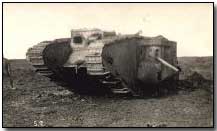 I saw George hurrying to
get behind a scrap of a hedge. He never got there. But he got
his "armistik" all right; he got it in the guts. I dropped on my knees
and crawled to that little bit of shelter.
I saw George hurrying to
get behind a scrap of a hedge. He never got there. But he got
his "armistik" all right; he got it in the guts. I dropped on my knees
and crawled to that little bit of shelter.
I saw stretched at full length, with his face towards heaven, a boy in grey with the down of youth upon his chin.
We were off our track. We turned left and reached a road. It was strange to see abandoned guns and parapets turned the wrong way. Down the road came two other figures in grey. One was leaning heavily upon the other. His shirt was torn off his back and there was a great gash in his flesh. We looked at each other in passing. We spoke to each other only with our eyes and went our ways.
Then a frightened group with hands in the air came towards us. Old Tom placed his bayonet on the grey tunic of one and sent the fear of God through his body. Tom laughed at the young boy's squeal, then quickly went through his pockets, jerked his thumb towards our lines, kicked his backside and went on.
The devil had a busy morning raking out his furnaces, but left us quiet for an hour in the churchyard of St. Julien in the afternoon. I tried to make some tea in a shell hole with the remains of my water, some old tea leaves and solidified methylated spirit.
There were too many snipers about to be very comfortable, but those of us who kept our heads low survived the hour. Our platoon was like a spearhead in the line. In the early evening the enemy opened out on us; in mistake our own guns opened, too.
"Better fall back a few yards," said the officer, and even as we were doing so something jabbed my hand. It dropped down and blood spurted out.
The others had gone. I was alone. The fire was not continuous. It came in fits and starts. In an interval my good hand helped me out. I dashed out and dropped in the shadow of a grave. I was seen. From the pillbox, hidden somewhere about, which had given us trouble all the day, a couple of bits of lead whistled. I crawled into an enormous shell hole and began to sink into mud.
With the slime clinging to me I got away, through the bottom of a hedge which, by the grace of God, had remained there. No one to be seen now and my head facing I knew not where.
A great, livid waste, the light of day going, and the way might be to the north or the south. I had lost my bearings.
Not far away a tank, half embedded, was getting it full tilt.
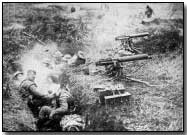 The
sweat stood on my dirty face. And then in that great expanse of mud
and wire I spotted a little red cross on a little flag, sticking eighteen
inches out of the ground.
The
sweat stood on my dirty face. And then in that great expanse of mud
and wire I spotted a little red cross on a little flag, sticking eighteen
inches out of the ground.
I felt safe again.
It was at the entrance to a cellar. The cellar was filled to overflowing. Men and bits of men were huddled there or stretched at full length.
"Better get on," said the doctor, noticing that my legs were whole. So, duly labelled, I turned to home again. I passed my mates with waterproofs on their shoulders, standing to.
I tried to run, but felt weak. Suddenly a barrage fell in front of me. I turned into the remains of a cottage by the side of the road, found a seat on an empty petrol tin in the corner, pulled down my tin hat to cover my face. But, like some venomous beast, the barrage crept nearer and soon bits of the brick wall began to fall. I was shaking with fright.
I decided to bolt the moment the barrage lifted. My arm was throbbing with pain. My leg had gone to sleep. I thumped it with my other hand - and life came back again and with it hope. There came a flash. I shut my eyes. A deafening crash and tumble of mortar. The firing stopped.
I bolted. Down the road zigzag, zigzag, to dodge the snipers, on and on nearer home. Soon I saw the white tapes. I followed. My throat was burning with thirst. I saw a watercart in a ditch and soon water was running down a long throat that asked for more and more.
In the early hours of the morning I tumbled into an electrically lighted dug-out dressing station two miles from the front line where there were clean bandages and steaming tea. I fell at full length, motionless. Someone pressed drink to my lips.
The journey was not ended. Soon they came to carry me on again.
"Got a couple of Jerries here. Do you mind if they go with you?"
Mind? Not if it was the whole German Army. They bundled us in together and we were off. The rain was falling piteously. At the field ambulance we were taken out. The place was full. Hope and despair lived there side by side.
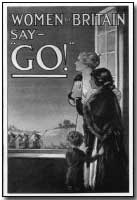 There were screams as the
broken bodies were lifted on to the tables for the surgeons' knives.
There was a great light on dirty faces of men as they sat on wooden forms,
their arms bared to the doctor who pricked the flesh with his inoculating
needle to carry its serum to attack the tetanus germ.
There were screams as the
broken bodies were lifted on to the tables for the surgeons' knives.
There was a great light on dirty faces of men as they sat on wooden forms,
their arms bared to the doctor who pricked the flesh with his inoculating
needle to carry its serum to attack the tetanus germ.
They took us to a tent on which the rain beat down ceaselessly and mercilessly. I fell on a stretcher and pulled the damp blanket on top of me. What did it matter? Rain-rain-rain. Far away the guns growled. Rain-rain-rain.
It splashed on to the canvas and dripped into the tent. Drip-drip-drip. Each drip seemed to fashion itself into a word - sleep. Sleep-sleep-sleep. Nearly twenty-four hours after the attack. To-morrow the hospital train - and Blighty. But now sleep. Sleep. Sleep. Sleep. S-l-e-e-p.
Oh, thank God! Thank God, s-l--e--e--p.
Alfred Willcox, a private in the Royal Sussex Regiment (various battalions), always on the Western Front, chiefly in the Salient. For a very brief period was a cook, but poisoned himself with coke fumes, to the relief of his comrades. In the 13th Sussex (Lowther's Lambs) when they took the village of St. Julien in the Third Battle of Ypres. The incidents in the narrative took place that day, when he was wounded.
First published in Everyman at War (1930), edited by C. B. Purdom.
Photographs courtesy of Photos of the Great War website.
A 'Tour' was a period of front-line service.
- Did you know?
